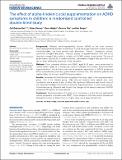The effect of alpha-linolenic acid supplementation on ADHD symptoms in children: a randomized controlled double-blind study
Citation
Dubnov-Raz, Gal, Zaher Khoury, Ilana Wright, Raanan Raz, and Itai Berger. 2014. “The effect of alpha-linolenic acid supplementation on ADHD symptoms in children: a randomized controlled double-blind study.” Frontiers in Human Neuroscience 8 (1): 780. doi:10.3389/fnhum.2014.00780. http://dx.doi.org/10.3389/fnhum.2014.00780.Abstract
Background: Attention deficit-hyperactivity disorder (ADHD) is the most common neuro-developmental disorder in childhood. Its pharmacologic treatment mostly includes methylphenidate, yet many parents seek alternative, “natural,” therapeutic options, commonly omega-3 fatty acids. Previous studies of supplementation with fish oil or long-chain omega-3 fatty acids to children with ADHD yielded mixed results. The use of alpha-linolenic acid (ALA), a medium-chained, plant-based omega-3 fatty acid (18:3 n-3), has not been sufficiently examined in this population. Methods: Forty untreated children with ADHD, aged 6–16 years, were randomized to receive either 2 g/day of oil containing 1 g ALA or placebo, for 8 weeks. Before and after supplementation, the children underwent a physician assessment of ADHD symptoms and a computerized continuous performance functions test. The children’s parents and teachers filled out Conners’ and DSM questionnaires. Results: Seventeen (42.5%) children completed the study, eight in the supplementation group, nine in the placebo group. Main drop-out reasons were capsule size, poor compliance, and a sense of lack of effect. No significant difference was found in any of the measured variables tested before and after supplementation, in both study groups. No between-group difference was found in the changes of the various measures of ADHD symptoms throughout the study period. Conclusion: Supplementation of 2 g/day of oil containing 1 g ALA did not significantly reduce symptoms in children with ADHD. Future studies in this field should consider an alternative method to deliver the oil, a higher dose, and a larger sample size.Other Sources
http://www.ncbi.nlm.nih.gov/pmc/articles/PMC4188038/pdf/Terms of Use
This article is made available under the terms and conditions applicable to Other Posted Material, as set forth at http://nrs.harvard.edu/urn-3:HUL.InstRepos:dash.current.terms-of-use#LAACitable link to this page
http://nrs.harvard.edu/urn-3:HUL.InstRepos:13347447
Collections
- SPH Scholarly Articles [6362]
Contact administrator regarding this item (to report mistakes or request changes)



